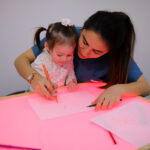Occupational Therapy in Individuals with Down Syndrome
ERGOTHERAPY FOR INDIVIDUALS WITH DOWN SYNDROME
Ergo therapy improves the physical, cognitive, sensory, psychological, social skills and abilities of the person through meaningful and purposeful activities; It is a person-centered health profession that aims to increase the level of independence and participation in daily life activities and to improve health and well-being. In individuals with Down syndrome; problems such as slow learning, difficulty in problem solving and decision making, drooling, difficulty in speaking, delay in motor development, frequent falls and bumps, low muscle tone and delay in fine and gross motor development due to laxity in joints are experienced. Occupational therapists in the treatment of these problems uses sensory integration, vestibular stimulation, oral-motor therapy, cognitive therapy, daily living activities training and activity-oriented neurodevelopmental therapy methods.
What do occupational therapists do during the rehabilitation process of individuals with Down syndrome?
Individuals with Down syndrome who have sensory integration problems such as dropping objects on the ground, taking objects in their mouth, difficulty in adjusting body position, falling frequently, not combing hair, etc., are provided with a correct adaptive response with sensory integration therapy. With sensory integration of individuals with Down syndrome; awareness of their body and environment increases.
By providing sensory integration, visual perception skills, body awareness and visual motor coordination training, the foundations of cognitive rehabilitation are laid. Academic skills are also supported by improving cognitive skills such as attention, memory, problem solving, and orientation. It is easier for individuals with Down syndrome to learn with cognitive rehabilitation.
In early childhood, with activities including auditory-visual stimulation, neurodevelopmental intervention methods for laxity in the joint-ligaments and low muscle tone; it enables them to perform independent motor skills such as sitting, standing and walking. Individuals with Down syndrome with ergo therapy exhibits controlled motor behavior.
Developing strength and coordination in the arm, wrist and hand with activities meaningful for the person increases the level of independence in fine motor skills and daily living activities. The increase in the quality of life of individuals who develop fine skills such as holding a pencil and holding a spoon increases internal motivation.
Individuals with Down syndrome can be independent in daily living activities.
Children with Down syndrome have problems with nutrition, saliva control and speech due to weak tongue, lip and cheek muscles. Occupational therapists intervene with oral motor therapy, positioning methods, and nutritional techniques.
Vestibular stimulation techniques enable early motor behavior to be revealed. Equilibrium reactions, movement quality is increased, gravity insecurity is prevented. Individuals with Down syndrome can climb stairs and swing without fear.
Neurodevelopmental and behavioral methods are used for the development of social skills such as initiating, maintaining and ending verbal and non-verbal transmission, and communicating with meaningful purposes. Individuals with Down syndrome can understand you and express themselves.

